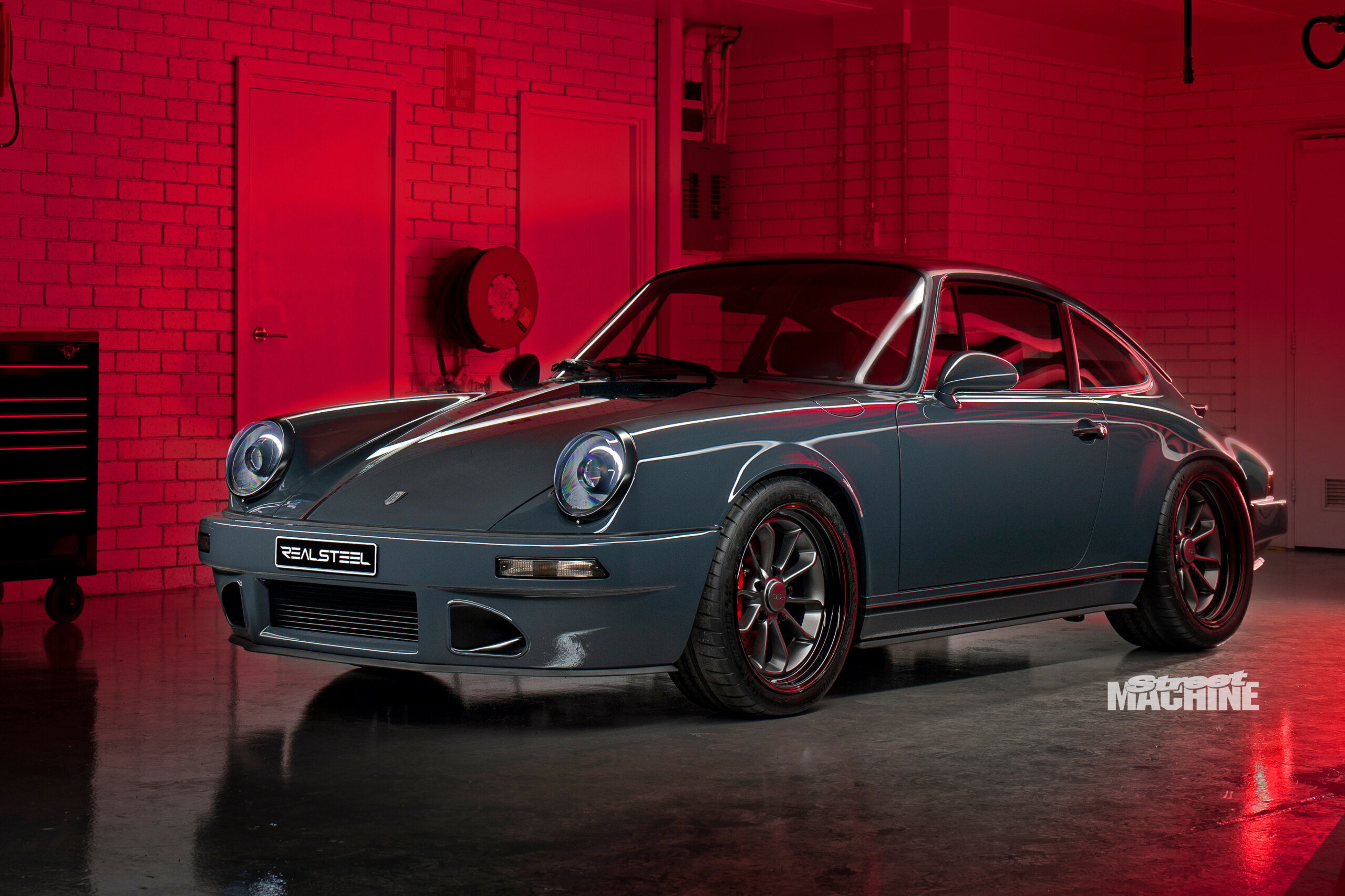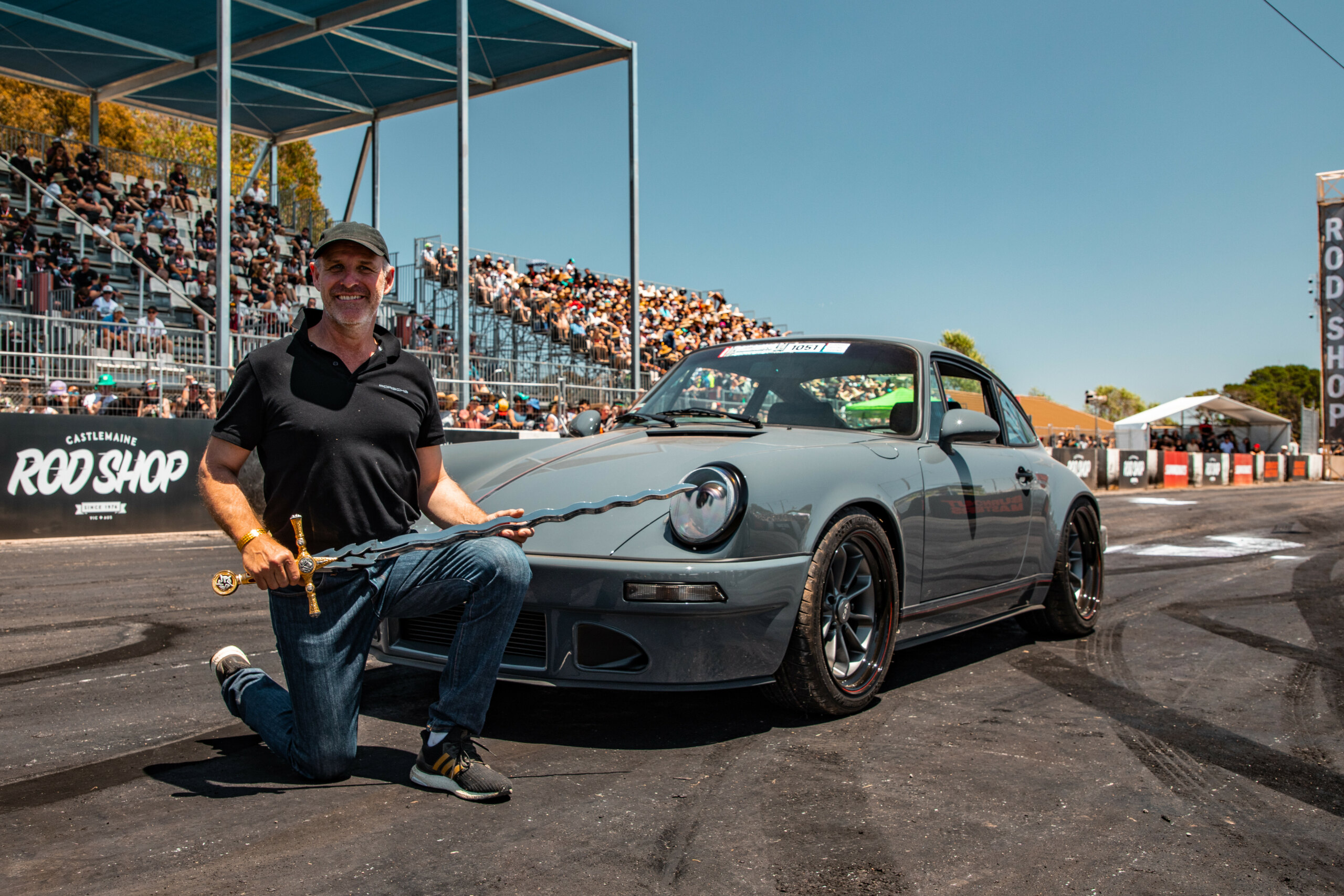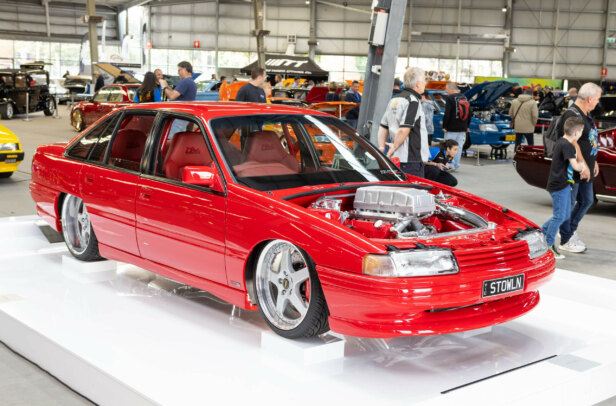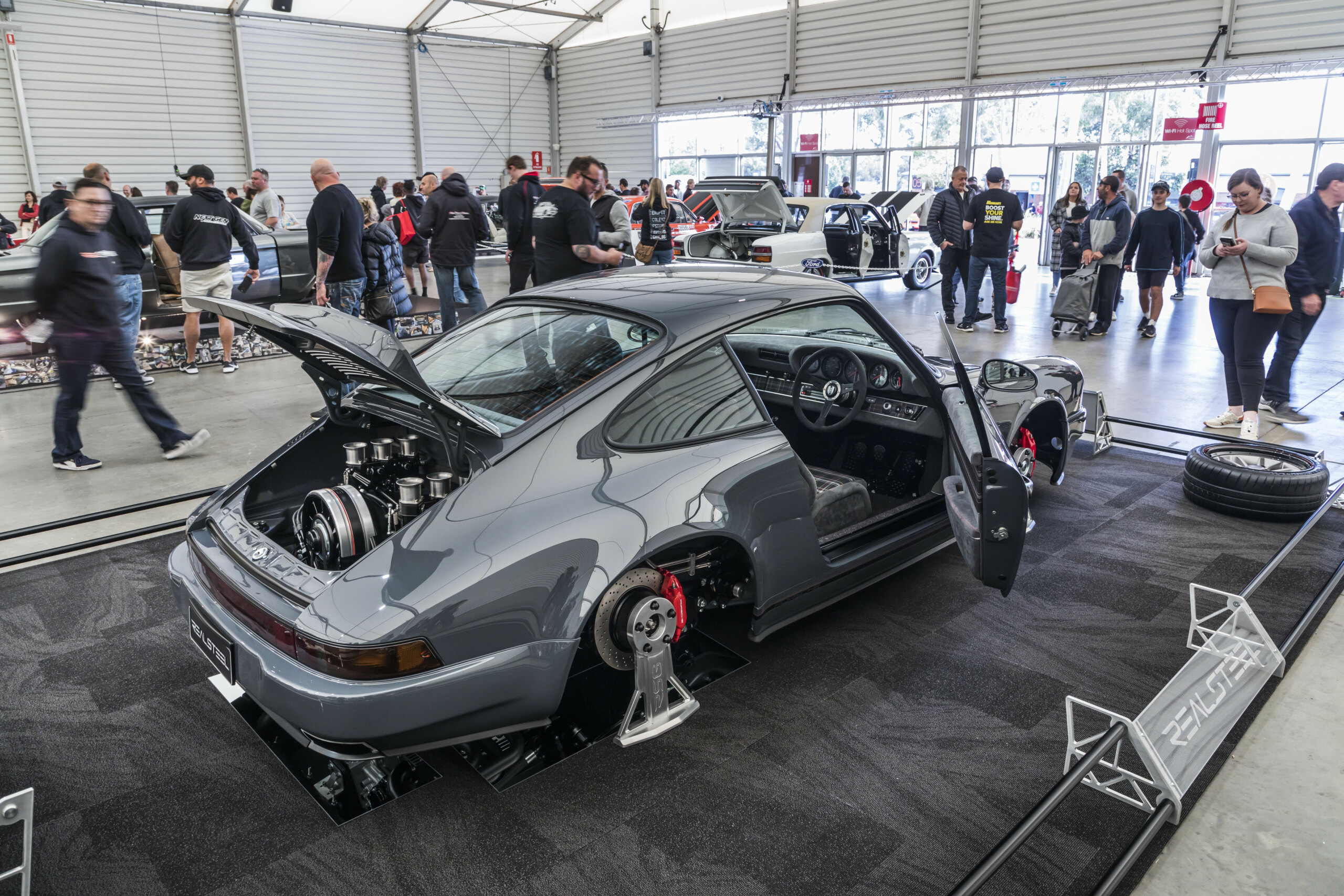A Porsche winning Top Street Machine Overall at Meguiar’s MotorEx? Say it ain’t so! Yet that’s exactly what this incredibly well-built and immaculately detailed 1978 911 SC managed at the 2022 event. And not only that, it also bagged three gold medals (Engine & Components, Design & Execution, Undercarriage & Driveline) and two silver (Bodywork and Paint) to boot!
First published in the December 2022 issue of Street Machine
Yep, this remarkable machine truly was a slinky Deutsch cat among the Street Elite pigeons, created by the talented crew at Real Steel Group in Queanbeyan, NSW for their customer Livi.
“At MotorEx, it was interesting watching people’s reaction,” says Real Steel head honcho Steve Mommsen. “Initially they’d give it a quick glance, but then would come back again and again, each time for a little longer as they began to comprehend what they were looking at, discovering new details each time they did a lap. The other big buzz for us was the number of well-known builders who made a point of coming over to tell us how good it was. It was a pretty good feeling.”
Before getting stuck into this build, owner Livi was anything but a Porsche fanatic. “I’m in the building game and I got it as part-payment for a job,” he says. “I really would’ve preferred the money; however, after a few years, I eventually fell in love and decided to give it a freshen-up – you know, do the engine up and a quick coat of paint.”
About two years into that process, Livi decided to approach Real Steel Group, which is when the build ramped up several notches. “Livi and the RSG team hatched a completely new, far more ambitious plan,” Steve says. “Livi loves and really appreciates high-quality engineering and fine detail, and while he was part of every decision, he essentially gave us free rein to build the car to this standard.”
“I liked how everybody at RSG got personally invested in the build,” Livi adds. “They all put in their own ideas and worked together to nut stuff out. I’m really stoked at how it turned out.”
The build theme that everyone decided on was to make the ’78 SC look like a modern 911 – albeit finished to a far higher standard than anything that’s ever rolled off the Stuttgart assembly line.
“Every part in this car is rebuilt or brand new – even the parts you can’t see,” Livi says. “I wanted all the detail, all the billet stuff, and yet have it still be raw and in-your-face and not lose any of its original charm or character.”
The amount of restyling is ridiculous. Hundreds of bespoke, one-off parts were CAD designed, clay modelled or 3D printed to check for aesthetic appearance and fitment before the final parts were made. Many surfaces were 3D scanned to ensure the newly machined parts fit perfectly no matter how complex the surface was that they had to mate up to. “We did a lot of parts more than once,” Steve says. “If we didn’t like something, we didn’t hesitate to go back in, remodel it in CAD and reprint another test.”
From there, hundreds of pieces were machined from billet aluminium in one of RSG’s 13 CNC machines and their water-jet cutter. These included the wheels, exhaust tips, engine cover grille, rear spoiler, air filters, clamps, caps, latches, door trim inserts, steering wheel boss, dash fascia and knobs, demister vents, horn button, wiring clips, retainers, washers, and ribbed heat exchanger covers. Other final parts such as the front air inlets and the heater ducting in the engine bay were 3D-printed in high-strength polycarbonate before being sanded and painted.
The use of unusual construction materials didn’t stop there. The front and rear splitters were hand-cut from engineering-grade plastic and then vapour-blasted to achieve the desired finish.
“CNC machining allows us to create pieces that would not be possible by hand,” says Steve. “It also allows us to use FEA [finite element analysis] in CAD to verify structural integrity. However, it all consumes tons of hours. Take the dash vents, for instance; they’re so delicate and so difficult to hold in the machine that there’s 30 hours of CNC time in them alone.
On top of that, there’s many more hours of CAD design, trial 3D printing and final finishing before finally being primed and painted. We Iridite-coated many billet parts. Essentially, it’s a clear chemical process that adds a protective film that stops oxidisation; we use it on a lot of the military and aircraft components we make.”
The flat six powering this Porsche is a screamer. Larger cylinder barrels bump capacity from 3.0 litres to 3.5 litres, filled with custom forged pistons that connect to the brutally strong 930 Turbo crank via Carrillo H-beam rods. There’s no shortage of air and fuel thanks to the pair of three-barrel, 46mm PMO carburettors, which are a bit like Webers but with three venturis instead of two.
In addition to substantial port and chamber work, the heads have been converted to a twin-sparkplug-per-cylinder configuration, as seen on later models. A pair of MSD 6AL control boxes trigger two MSD Blaster coils to fire the plugs through the Patrick Motorsports dizzy.
On ESP Racing’s hub dyno, the 911 blasted out 275rwhp, with a ton of midrange. “Being such a light car, it really hammers and is wild to drive thanks to the sticky rubber,” Livi says. “It’s a bit hard to explain the enjoyment I get from driving it.”
Of course, more power equals more heat. To combat this, RSG designed a custom fan shroud and ductwork. And while Porsches are universally known as being air-cooled, the reality is that the engine oil does half that work, so to enhance oil cooling, the original dry sump pump has been upgraded with one from a late-model GT3.
PWR fabricated a larger oil cooler that sits behind the big ducts in the front bumper. A pair of perfectly fitting, mandrel-bent, stainless-steel hard lines join the coolers to the engine, secured by CNC-machined clamps.
Despite its age, the German body was in remarkably good condition. The worst offenders were the deleted factory sunroof and a dodgy right-hand-drive conversion, which RSG rectified using NOS RHD panels.
To give the car a hunkered-down stance, sill extensions fabricated from steel were added; these tie into the radically modified fibreglass front and rear bars. After file-finishing the body, RSG laid on the super-sanitary PPG Grauschwarz grey paint, a factory colour from a later-model Porsche.
A lot of thought went into tying all the colours together. The wheels match the Alcantara interior cloth, while the red stripe up the bonnet and down the sides complements the red in the tartan inserts inside.
“The tartan is actually from a Golf GTi,” Steve says. “We were looking through a catalogue of different tartans and spotted this one; Livi and the rest of us all agreed it would be the perfect finishing touch.”
The trimming of that custom interior was one of the few areas not 100 per cent handled in-house by RSG, with Eastcoast Trimshop and GAS Auto Trim both pitching in.
As with any good street machine, the Porsche’s stance is spot-on. It took a lot of massaging and careful planning to stuff such fat rubber under standard, narrow-body guards. Despite consuming a massive amount of hours, this giant-slaying Porsche has been built to be functional and 100 per cent driveable.
“I’ve already put a few miles on it,” says Livi. “I really want to show it off to people, and I definitely want to take it back to the track.”
Equally at home at shows, on the street and on the track – a Top Street Machine indeed!
Red hot
Anybody who has driven an early Porsche Turbo would be all too aware that these autobahn stormers had way more go than they had whoa. Porsche addressed this in the mid-90s when it released its big Brembo brake package. Universally known as Porsche ‘Big Reds’, they feature four-piston calipers front and rear, with 322x32mm rotors up front and 309x28mm ones out back. When it came to factory-fitted, high-performance brakes, the Big Reds pretty much remained the worldwide benchmark for nigh on a decade.
This ’78 SC now wears a set of Big Reds thanks to custom mounting brackets, along with custom hats for the two-piece rotors.
Livi Krevatin
1978 PORSCHE 911 SC
| Paint: | PPG Vibrance Grauschwarz |
|---|---|
| ENGINE | |
| Brand: | Porsche 3.5L |
| Carbies: | Twin 46mm three-barrel PMO downdraught |
| Inlet manifold: | PMO |
| Heads: | Twin-plug Porsche |
| Camshafts: | Custom grind |
| Pistons: | Forged |
| Rods: | Carrillo H-beam |
| Crank: | 930 Turbo |
| Dry sump: | Patrick Motorsports |
| Oil pump: | GT3 |
| Oil cooler: | Front-mounted PWR |
| Fuel system: | Bosch |
| Exhaust: | Modified stainless-steel Fabspeed system |
| Ignition: | Patrick Motorsports twin-spark distributor, twin MSD 6AL and MSD Blaster coils |
| TRANSMISSION | |
| Gearbox: | Porsche 915 five-speed |
| Clutch: | Patrick Motorsports billet |
| Diff: | ZF LSD with 930 Turbo driveshafts |
| SUSPENSION & BRAKES | |
| Front: | Strut front end, Blistein shocks, heavy-duty torsion bars |
| Rear: | IRS, Blistein shocks, heavy-duty torsion bars |
| Bushes: | Elephant Racing monoball |
| Brakes: | Porsche ‘Big Red’ Brembo four-piston discs (f & r) |
| Master cylinder: | Twin Tilton with balance bar |
| WHEELS & TYRES | |
| Rims: | Custom RSG three-piece; 18×8.5 (f), 18×9.5 (r) |
| Rubber: | Michelin Pilot Sport; 235/40R18, 265/35R18 |
THANKS
The whole team at Real Steel Group: Steve, Naz, Jimmy, Jason, Ludy, Connor, Phil, Clancy, Rhys, Alex, Rene, Graham, Nick, Josh and Niall




Comments